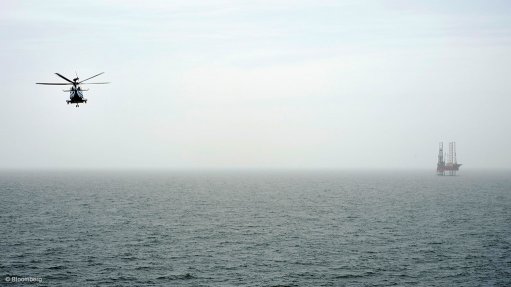
Energy company Shell has handed over rare, high-quality three-dimensional (3D) seismic data, collected off the west coast of South Africa, to the universities of the Western Cape and Cape Town to be used for the advancement of research and skills development relevant to the oil and gas industry.
The data, which covered an area of 8 000 km2 in the Orange basin had been collected by Shell during its recent offshore exploration programme.
Shell was making more than half its data set available to the universities; however, the bottom half of the data set remained confidential, as it related to oil and gas prospects in the area, Shell Orange basin exploration team leader Piet Lambregts said.
“[The data shared with the universities] has no business value but we believe it has great academic value. The quality of the data is excellent. You can see the subsurface of the earth in that area very clearly. Nothing is covered with what scientists call “noise” and there are no poor data zones,” Lambregts said.
He added that the data was well suited for teaching students scientific interpretation skills.
“Once they understand geological processes, they can go on to use this knowledge in the mining, oil or gas industries when they come across similar geological scenarios,” he said, adding that this would enable students to be employed in the sector.
University of the Western Cape (UWC) Earth Science Department chairperson Professor Charles Okujeni said the data would pave the way for students to do research relevant to the industry and for them to be exposed to state-of-the-art skills.
“As geologists, we know the value of this data. Until now, we have never really had raw, cutting-edge data from such recent exploration work. It has all the useful elements for the characterisation of petroleum systems,” he said.
Okujeni added that there was a significant shortage of people in the country studying petroleum geoscience as, historically, South Africa had never really been an oil-producing area.
“Now, as the big companies do more exploration – and with the potential developments of shale gas, there will be a need for skills in this area. Data such as this will help greatly towards that end,” he said.
Meanwhile, UWC Masters Programme in Petroleum Geosciences director Dr Mimonitu Opuwari said these seismic data sets would, in particular, enable masters students in his programme to complete mini-theses towards their degrees.
“This initiative will give students hands-on experience with a data set – they will learn how to come up with their own interpretations of the data, which is invaluable experience in their field.
“The Orange basin is really underexplored so this data will provide fresh insight into its viability. Once the viability is established, this could lead to an increase in the energy sector in South Africa and, of course, to greater employment opportunities in the country,“ Opuwari said.
Further, University of Cape Town Department of Geological Sciences geophysics lecturer Dr Beth Kale said her department would use the data for training undergraduates in interpreting data and for use in research projects at honours and masters level.